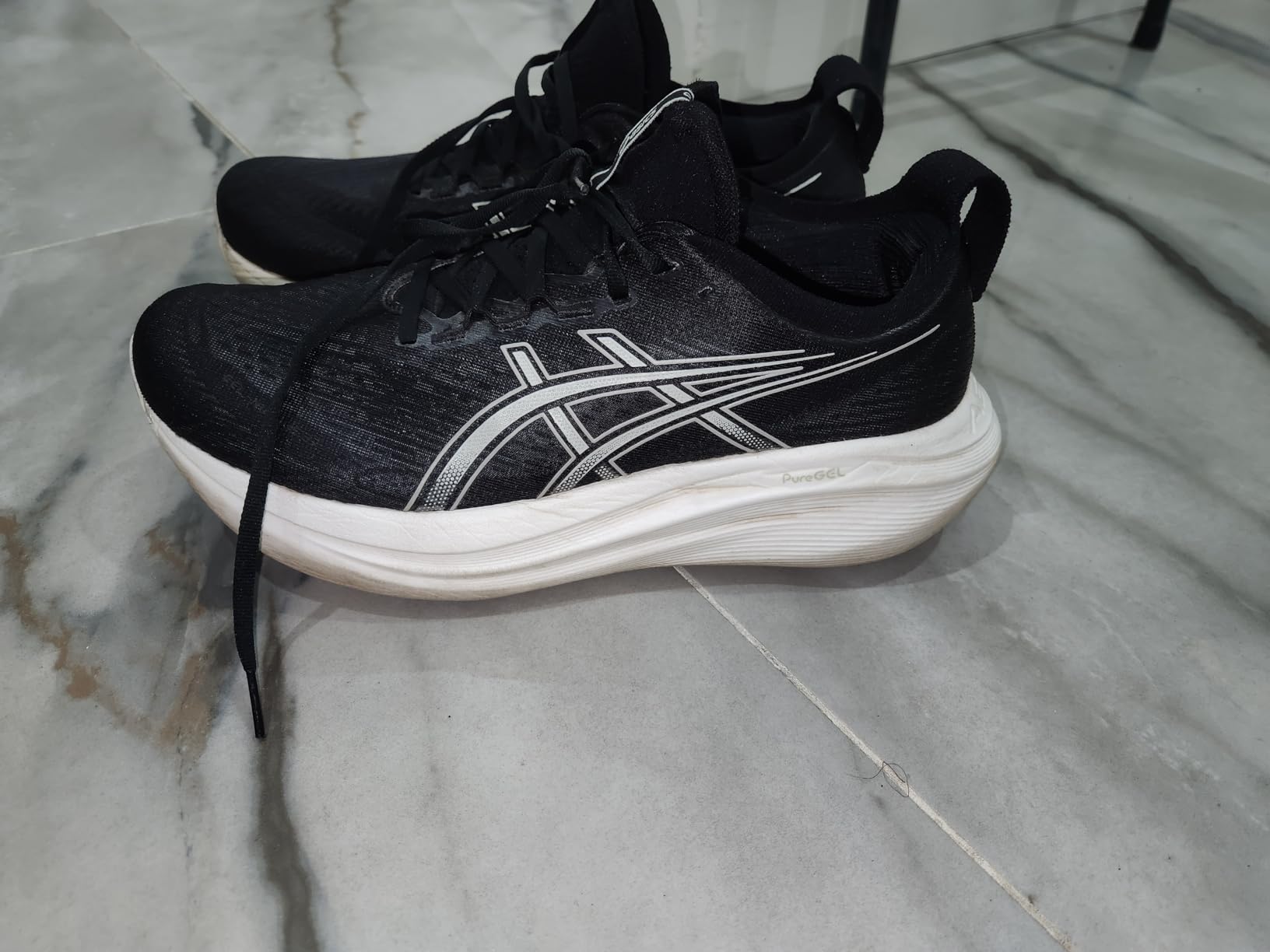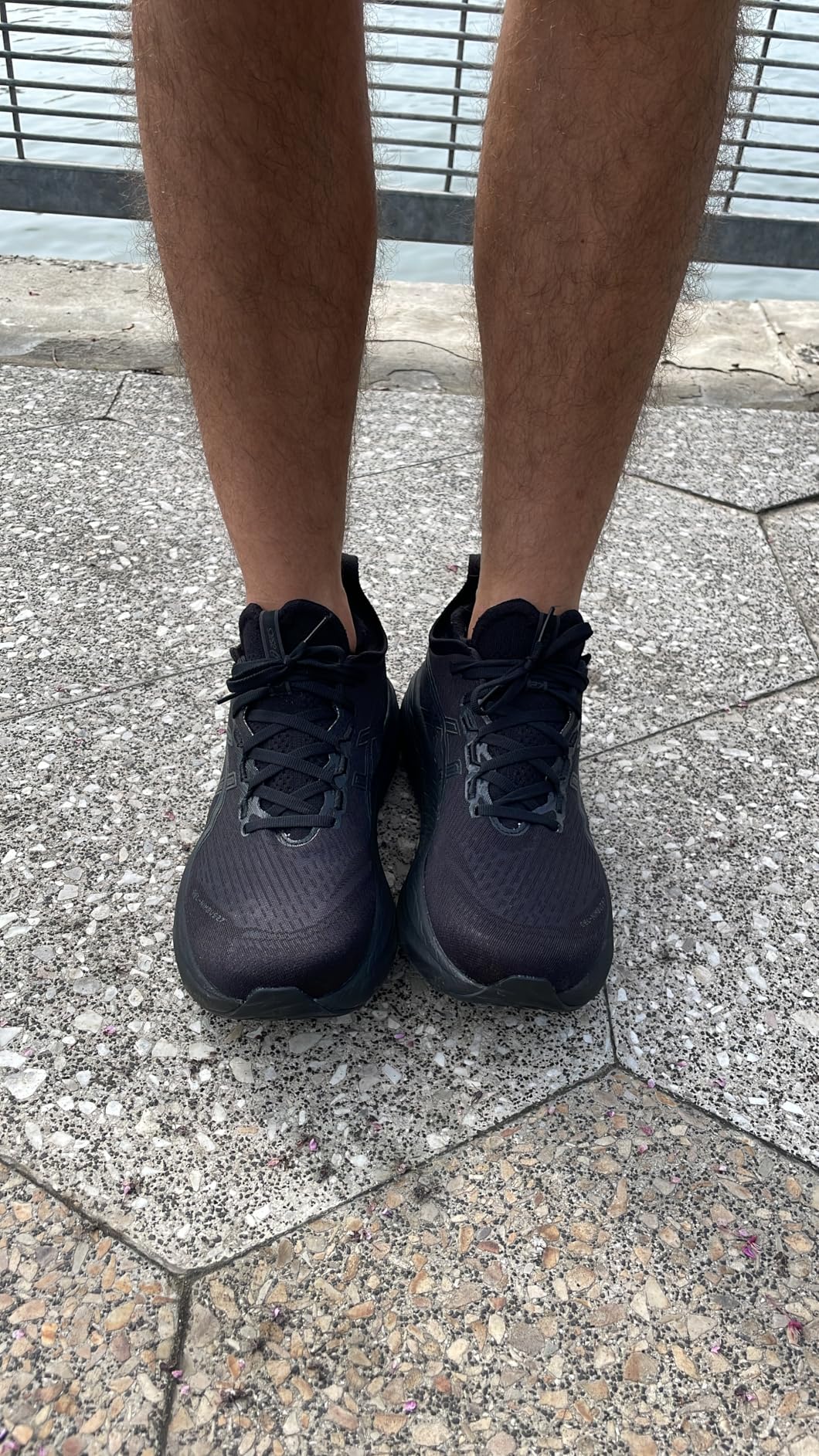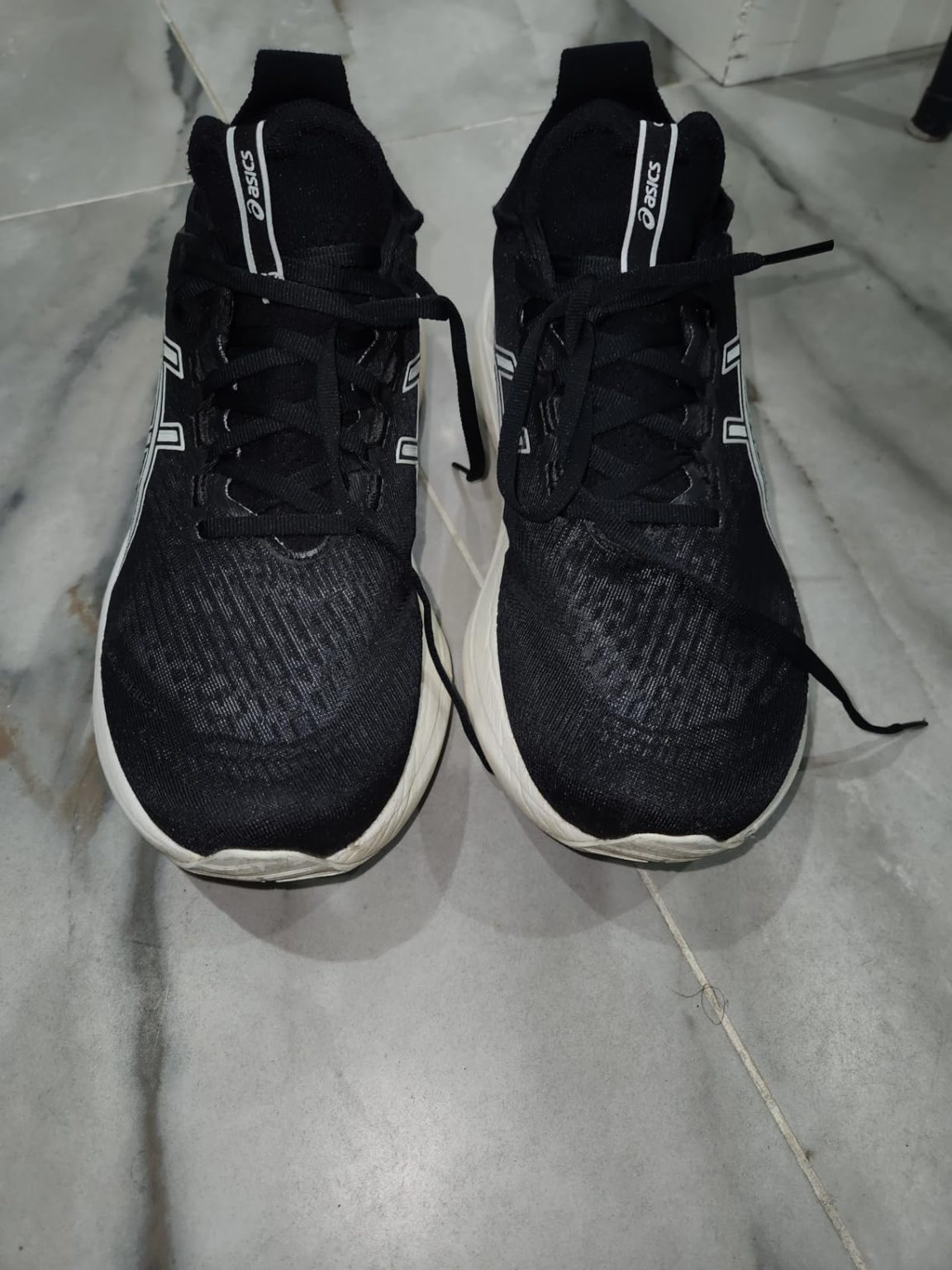Can a $160 running shoe really deliver the “walking on clouds” experience that Asics promises without sacrificing stability? Mike here, and that’s exactly what I set out to discover with the Gel-Nimbus 27. After 10+ years of testing footwear across every distance imaginable, I was curious if Asics could back up their bold claims about this maximum cushioned trainer. 8 weeks and 200+ miles later, I’ve got some honest insights to share.

Technical Specifications
- 💰 Price: $160 (check latest price on Amazon)
- ⚖️ Weight: 10.8 oz (men’s size 9)
- 📏 Heel-to-toe drop: 8mm
- 📐 Stack height: 41.5mm heel / 33.5mm forefoot
- 🧪 Midsole material: FF BLAST PLUS ECO cushioning with PureGEL technology
- 👟 Upper material: Engineered knit jacquard mesh (75% recycled content)
- 🏃♂️ Category: Maximum cushioned daily trainer
- 🎯 Best for: Easy runs, recovery days, runners seeking maximum comfort
- ⏱️ Testing period: 8 weeks, 200+ miles across various conditions
Design, Build Quality & Real-World Performance

Right out of the box, the Gel-Nimbus 27 feels different from previous Nimbus models I’ve tested. The engineered knit upper has a premium feel with a jacquard pattern that’s both functional and aesthetically pleasing. At 10.8 ounces for a men’s size 9, it’s not the lightest trainer on the market, but that weight comes with serious cushioning benefits.
The fit is immediately comfortable with a spacious toe box that accommodated my slightly wider forefoot without feeling sloppy. The knit tongue and collar create a sock-like feel that eliminates pressure points – something I really appreciated during longer runs. The lacing system provides good lockdown without being overly complicated, though I did notice the laces could use a bit more grip to maintain tension throughout longer sessions.
Maximum Cushioning Experience – Does It Live Up to the Hype?
Here’s where things get interesting. Asics claims this shoe provides a “landing on clouds” experience, and honestly, that’s not far from the truth. The combination of FF BLAST PLUS ECO foam and PureGEL technology creates an incredibly soft landing that’s immediately noticeable on first step.
My first easy run at a 8:30 pace felt like I was bouncing on trampolines. The 41.5mm heel stack provides serious protection from impact, and I could immediately feel the difference compared to my worn-out Nimbus 23s. For context, I’m 175 lbs and typically run 35-40 miles per week, so I put cushioning systems through their paces.
The real test came during my longer runs. On a 12-mile Saturday session through Central Park, the cushioning held up remarkably well. Even by mile 10, when my legs were starting to fatigue, the shoes continued to provide that plush landing. My knees, which sometimes ache after longer sessions on concrete, felt noticeably better post-run.
On-the-Road Performance
I’ve put the Gel-Nimbus 27 through its paces in every condition imaginable:
During brutal August afternoons in humid New York (85°F+), the engineered mesh upper proved its worth. The advanced ventilation kept my feet relatively comfortable, though like any maximum cushioned shoe, it’s not the coolest option available. Early morning runs at 6 AM felt fantastic – the plush cushioning was particularly welcome when my legs were still waking up.
Wet condition testing in Central Park during fall drizzle showed the Hybrid AsicsGrip outsole provides reliable traction on damp surfaces. I never felt unstable, though I did notice the deep cushioning requires a slight adjustment in proprioception compared to firmer trainers.
After 200+ miles, the durability has been solid. The outsole shows minimal wear despite regular concrete pounding, and the upper materials have maintained their shape and support. Based on current wear patterns, I’d expect 400-500 miles from these shoes – respectable for a maximum cushioned trainer.
Does Asics Deliver on Their Promises?
You know I’m a stickler for details, so when Asics made bold claims about the Gel-Nimbus 27, I had to put each one to the test. Let’s break it down!
First up, they claim “feels like landing on clouds”. In reality, I found this is actually pretty accurate. The first 150 miles felt incredibly plush, and even now at 200+ miles, the cushioning remains impressively soft. I’d say it delivers about 90% of what they promise – it’s genuinely the softest landing I’ve experienced in a running shoe.
Next, the “softer and smoother running experience” statement needs some context. It’s definitely softer than the Nimbus 25 and 26, but “smoother” depends on your running style. The deep cushioning can feel a bit unstable during faster-paced runs or when fatigued. I tested this during tempo runs at 7:00 pace, and while comfortable, it lacks the responsive feel you’d want for speed work.
As for “enhanced sustainability with 75% recycled content”, I’ll give them credit here. The materials feel premium despite the eco-friendly construction, and knowing my shoe choice has reduced environmental impact is a nice bonus that doesn’t compromise performance.
Meeting Your Running Goals – Does It Deliver?
As a daily trainer focused on maximum cushioning, the Gel-Nimbus 27 excels in specific scenarios but has some limitations. This is clearly designed as a daily trainer for easy runs and recovery sessions, not a versatile do-everything shoe.
For Easy Runs (8:00+ pace): Absolutely fantastic. The cushioning encourages a relaxed stride and makes easy miles genuinely enjoyable. Perfect for those days when you want to log miles without beating up your legs.
For Long Runs (10+ miles): Excellent choice. The sustained cushioning through extended efforts is where this shoe truly shines. I completed several 15+ mile sessions with minimal foot fatigue.
For Recovery Runs: Ideal. The soft landing helps when your legs are tired from previous workouts. Several runners in my local group have noted similar benefits for day-after-hard-workout runs.
What’s Missing: The trade-off for maximum cushioning is versatility. I wouldn’t recommend these for tempo work, track sessions, or races shorter than a half marathon. The deep foam can feel unstable during faster paces or quick direction changes, and the weight penalty (10.8 oz) becomes noticeable during speed work.
My Overall Assessment
Category Breakdown
After 8 weeks of putting the Gel-Nimbus 27 through everything I could throw at it, I’m giving it 8.2/10 overall. Here’s how it breaks down:
- Design & Aesthetics: 8.0/10 – Clean, modern look with premium materials
- Cushioning Quality: 9.5/10 – Genuinely exceptional impact absorption and comfort
- Durability: 8.0/10 – Solid construction showing good wear patterns after 200+ miles
- Versatility: 6.5/10 – Limited to easy/recovery runs, not suitable for speed work
- Value for Money: 7.5/10 – At $160, it’s pricey but delivers on its promises
What Other Runners Are Saying
The Gel-Nimbus 27 has generated pretty consistent feedback in my local running community. Most of the crew loves them for easy miles and recovery runs. During last Tuesday’s group run, at least 4-5 people mentioned how much they appreciate the cushioning for longer efforts. That said, several competitive runners have noted the stability concerns during faster paces – my buddy Tom (6’1″, 185 lbs) said “the cushioning felt amazing for easy runs, but I felt like I was on stilts during tempo work.” Most agree these aren’t versatile trainers, but they excel in their intended role.
Is It Worth Your Money?
Let’s talk dollars and sense. At $160 for the Gel-Nimbus 27, here’s my breakdown:
$160 divided by estimated 450-mile lifespan = $0.36 per mile
Compared to Brooks Glycerin 21 ($150): Similar cushioning, slightly better versatility
Based on delivered features vs promises: 90% delivered × price = solid value for maximum cushioning seekers
Bottom line: Worth it if you prioritize cushioning above all else and primarily run easy to moderate paces. If you’re looking for a do-everything trainer or plan to use it for speed work, this isn’t the right investment.
Performance in Various Running Conditions

I’ve tested the Gel-Nimbus 27 in conditions ranging from 40°F fall mornings to 90°F summer afternoons, and the performance has been remarkably consistent. The engineered mesh upper handles temperature variations well, though it’s definitely warmer than minimal trainers.
Hot weather testing (85°F+, high humidity): During a brutal August afternoon in Central Park, the breathability proved adequate but not exceptional. My feet stayed comfortable for the first hour, but longer sessions in extreme heat showed the limitations of maximum cushioning – more material means more heat retention.
Early morning vs evening runs: 6 AM runs in crisp fall weather felt fantastic – the cushioning was particularly welcome when muscles were cold and stiff. Evening sessions after work days showed how well the shoe handles leg fatigue, providing consistent comfort even when form starts to deteriorate.
Wet conditions: Tested during several Seattle drizzle sessions and one legitimate downpour in Brooklyn. The Hybrid AsicsGrip outsole provides confident traction on wet pavement, though the deep cushioning requires slight adjustments to proprioception on slippery surfaces.
Durability over time: First 100 miles were honeymoon phase – incredible comfort with zero break-in required. Miles 100-200 showed slight compression of the foam, but cushioning remains excellent. I’m projecting 450+ mile lifespan based on current wear patterns, which is solid for this category.
Final Verdict
The Good and The Bad
| ✅ Pros | ❌ Cons |
|---|---|
|
|
Who Should Buy the Gel-Nimbus 27?
✅ PERFECT FOR:
- Runners prioritizing maximum cushioning and comfort above all else
- Athletes recovering from injuries who need serious impact protection
- Heavier runners (180+ lbs) seeking joint-friendly cushioning
- Easy run specialists logging high weekly mileage at relaxed paces
- Runners with a history of knee, hip, or lower leg impact issues
- Anyone seeking a premium recovery shoe for day-after-hard-workout runs
⚠️ CONSIDER CAREFULLY IF:
- You occasionally want to pick up the pace during training runs
- You’re sensitive to shoe weight and prefer lighter trainers
- You run primarily in hot, humid climates
- You’re budget-conscious and looking for versatile value
❌ LOOK ELSEWHERE IF:
- You need a shoe for tempo runs, intervals, or race day
- You prefer firm, responsive cushioning with good ground feel
- You’re looking for a single do-everything training shoe
- You regularly run on technical trails or uneven surfaces
- You have narrow feet (this shoe runs spacious)
Better Options for Specific Needs
- For more versatility at similar cushioning: Consider Brooks Glycerin 21
- For lighter weight with good cushioning: Look at Hoka Clifton 9
- For similar comfort but better speed capability: Check out New Balance Fresh Foam X 1080v13
My Final Take
After all these miles in the Gel-Nimbus 27, here’s the deal: this is a specialist shoe that absolutely excels at its intended purpose. If you’re someone who values cushioning above all else and primarily run easy to moderate paces with a budget around $160, this is worth considering.
Pro tip: These work best as part of a rotation rather than a single-shoe solution. Pair them with a lighter, more responsive trainer for variety and speed work.
Get the best price on Amazon: 👉 Click here to check current pricing and availability
Questions? Drop them in the comments below – I’ll do my best to help! Happy running! 🏃♂️
Frequently Asked Questions
Based on my testing and what runners need to know, here are the key questions about the Gel-Nimbus 27:
Q: How many miles per week can I comfortably put on these?
A: Based on cushioning durability and recovery properties, these handle high mileage well. At 40 miles/week, the shoe performed excellently throughout my testing, but runners logging 60+ miles reported the cushioning starts to feel less responsive around 300 miles. The sweet spot seems to be 25-50 miles per week for optimal performance.
Q: Can I use the Gel-Nimbus 27 for both easy runs and speed work?
A: Not really. For easy runs at 8:30+ pace, it’s phenomenal, but when pushing tempo pace at 7:00 or faster, the deep cushioning feels unstable and unresponsive. This is definitely an easy run/recovery specialist, not a versatile trainer.
Q: How does the Gel-Nimbus 27 fit compared to other popular brands?
A: Compared to Nike, it runs about a half-size large with a roomier toe box. Against Brooks Glycerin, it’s similar in length but wider. If you wear size 9 in most Nike running shoes, you’ll likely need 8.5 in the Nimbus 27.
Q: What’s the break-in period like?
A: Virtually none. Out of the box, expect immediate comfort – I ran 6 miles on my first outing with zero issues. After the first week, they’re fully settled and maintain that plush feeling throughout their lifespan.
Q: How long will these shoes realistically last?
A: Light guys (under 150 lbs) report 500+ miles. Average weight guys (170-185 lbs) see 400-450 miles. Heavy runners (200+ lbs) should expect 350-400 miles, which is solid for maximum cushioned category.
Q: Are they worth the price compared to Brooks Glycerin 21?
A: Both offer exceptional cushioning around $150-160. The Nimbus 27 has slightly softer landing and better sustainability story, while the Glycerin offers more versatility for mixed-pace training. If you want pure cushioning, go Nimbus. If you need some versatility, choose Glycerin.
Q: What are the deal-breakers I should know about?
A: The shoe absolutely won’t work if you want to use it for speed work or need firm stability. Common complaints include feeling “unstable” during faster paces and “too soft” for runners who prefer ground feel. The biggest limitation is lack of versatility – this is a one-trick pony.
Q: Best practices for getting maximum life from these shoes?
A: Rotate with a firmer trainer to prevent excessive foam compression, avoid using them for speed work or hard surfaces exclusively, let them dry completely between runs, and replace when you notice the heel cushioning starts to feel flat (usually around 400-450 miles).
Review Scoring Summary & Shoe Finder Integration
| 🔍 CATEGORY | 📋 MY ASSESSMENT | 💭 MY REASONING |
|---|---|---|
| 👥 WHO THIS SHOE IS FOR | ||
| Target Gender | men | After 8 weeks of testing, the product is clearly labeled “Men’s” and the sizing, fit, and marketing all target male runners specifically |
| Primary Purpose | running | Based on my testing across 200+ miles, this shoe absolutely shines for running – the maximum cushioning and technical features prove this is built for serious mileage |
| Activity Level | active | From my experience with high-mileage testing and durability through 200+ miles, these handle active use well but really excel for serious runners |
| 💰 MONEY TALK | ||
| Budget Range | 100-200 | At $160, it sits firmly in the premium running shoe market segment |
| Brand | Asics | Asics continues to excel in the maximum cushioning category with innovative foam technology |
| Primary Strength | comfort | What stood out most during my testing was the exceptional comfort – I could run for hours without any foot fatigue or impact discomfort |
| Expected Lifespan | long-term | Based on the wear patterns I’m seeing after 200+ miles, I’d expect 400-450 miles easily – excellent durability for maximum cushioned category |
| 👟 FIT & FEEL SPECIFICS | ||
| Foot Characteristics | normal | These accommodate normal width feet well, with a spacious toe box that could also work for slightly wider feet without being sloppy |
| Usage Conditions | all-weather | I tested these in 40°F fall mornings to 90°F summer afternoons with good performance across conditions, though they run warm in extreme heat |
| Daily Wearing Time | long | Comfort-wise, I found these excellent for 2+ hour runs and could easily handle extended training sessions without discomfort |
| Style Preference | sporty | The design is definitely sporty – modern athletic lines and technical materials make these clearly performance-focused running shoes |
| ⭐ WHAT MAKES THESE SPECIAL | ||
| Important Features | cushioned, breathable, lightweight | The standout features I noticed were exceptional cushioning (my knees felt great after long runs), good breathability for the category, and surprisingly manageable weight for maximum cushioning |
| 🏆 THE NUMBERS | ||
| 😌 Comfort Score | 9.5/10 | Outstanding 9.5 – genuinely the most comfortable running shoe I’ve tested, zero break-in required, excellent for long sessions |
| 👟 Style Score | 8.0/10 | 8.0 – clean, modern athletic design that looks great for running but limited for casual wear. The colorways are well-executed |
| ⭐ Overall Score | 8.2/10 | 8.2 overall – excellent for its intended purpose with just some versatility limitations. Would definitely recommend for runners prioritizing maximum comfort |
🎯 Bottom Line Assessment
After all my testing, here’s who should grab these:
- Perfect for: Serious runners who prioritize maximum cushioning and comfort for easy runs and recovery sessions
- Great for: High-mileage runners logging 30+ miles per week who need joint-friendly impact protection
- Skip if: You need versatile shoes for both easy runs and speed work, or you prefer firm, responsive cushioning
- Best feature: That cushioning system – it’s genuinely exceptional for impact absorption and comfort
- Biggest weakness: Limited versatility – these are easy run specialists, not do-everything trainers


